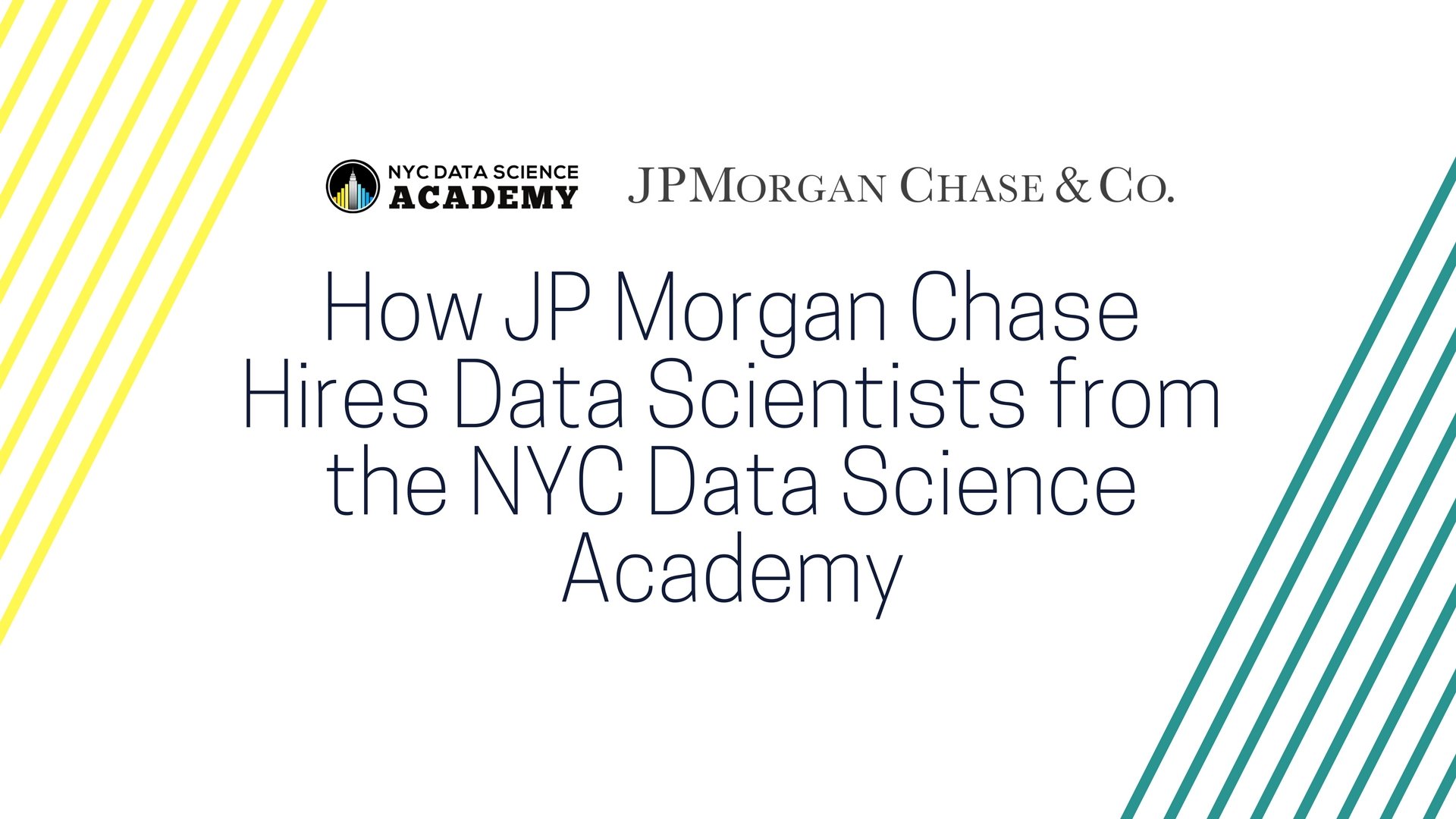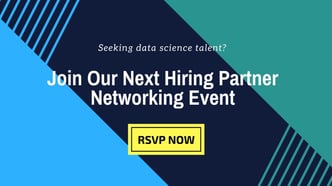How JP Morgan Chase Hires Data Scientists from the NYC Data Science Academy
Posted by Vivian Zhang
Updated: Mar 23, 2017

JP Morgan Chase is one of the world’s leading financial institutions and an exciting place to work as a data scientist. And, competition for data science jobs there is very, very high.
We recently spoke with Dr. John Maiden, Data Scientist at JP Morgan Chase’s Digital Intelligence team, to learn more about what he looks for in data science applicants and why he hires graduates from the NYC Data Science Academy.
Tell us about your role at JPMorgan Chase. What type of projects do you do? How big is the team you work with?
The Digital Intelligence team is comprised of data scientists, product managers and engineers who are building next-generation personalization and recommendation systems for banking, payment, commerce and financial advice. Our team is responsible for deeply personalizing the user experience of millions of our customers using the firm’s massive datasets and machine learning platforms.
How did you get connected with The NYC Data Science Academy?
I was looking to learn more about data science, and the Machine Learning with Python course offered through NYC Data Science Academy was a good match for what I wanted. I attended the course from Nov to Dec 2014. My presentation on “Job Salary Prediction with Python” is here.
Have you hired any NYC Data Science Academy grads yet?
We’ve hired two grads.
What types of roles did you hire those grads for?
Both were hired as entry-level data scientists. One works on applying data science techniques to drive marketing campaigns and the other works on improving the big data technology behind our modeling pipeline.
What stood out about those students that got them the job?
Generally we look for candidates that are strong in statistics, programming, and machine learning. We design, prototype, and build everything that we do, so we need people that are able to take a model from concept all the way to production.
What are the baseline requirements needed to be a data scientist at JP Morgan Chase? Do candidates need a certain type of degree? Is it a requirement to have a PhD?
There are multiple data science teams at JP Morgan Chase, and the requirements vary significantly depending on the team. For the Digital Intelligence team, an entry-level data scientist would have a PhD in a STEM field or a Master’s degree plus a couple of years of experience in data science.
What types of technical skills do you look for (programming in R, Hadoop, etc)?
We’re constantly learning new technologies (e.g. Spark, Cassandra), so we prefer candidates that have a background in R or Python, an object-oriented language (e.g. C++, Java), and SQL. Willingness to learn new languages and platforms is critical.
How important is it that applicants have experience building models or working on real life projects?
It’s the dividing line between a good candidate, who knows how the techniques work in theory, and an excellent candidate, who knows how the techniques work through actual experience. Seeing participation in a Kaggle competition is always a nice feature on a resume.
Is there something non-traditional that you look for in applicants?
Data scientist is a non-traditional career to begin with, so generally we look for people that can apply solutions to large, messy real world problems. Very little of what we do is straightforward data analysis; we spend most of our time wrangling messy datasets to provide actionable insights.
What is your typical interview process for data scientist applicants? What goes into a technical interview?
Depending on the candidate and the role, we’ll have two to three rounds of interviewing. A technical interview will involve programming questions combined with modeling scenarios.
How did you meet the students that you've hired from the NYC Data Science Academy?
We regularly attend the networking events that are held at the end of each bootcamp. I’m always personally excited to learn about the projects that students are working on.
Do you see most NYC Data Science Academy graduates going into straightforward Data Scientist roles or are there other types of roles that students can get when they graduate from the NYC Data Science Academy?
Data science is a very broad industry, and having the tools to analyze and interpret data can be applies in a wide variety of roles.
How do you ensure that your new hires from the NYC Data Science Academy are acclimating to their new position and are supported in their learning at JPMorgan Chase? Do do you have formal mentorship or apprenticeship programs in place?
We have a standard mentorship process that guides each new hire through all of the roles that the team performs. We also strive to maintain an up to date knowledge base of all of our ongoing projects, and regularly hold discussion groups to cover new topics in statistics, programming, and machine learning.
Do JP Morgan Chase and the NYC Data Science Academy have a nice feedback loop? Do you communicate, attend events, exchange feedback, etc?
Vivian Zhang is very proactive about soliciting feedback from us about the students we talk to and the quality of the program, and we’re always happy to oblige.
Is there anything else you’d like to share with other data science employers about your experience working with data science bootcamps like the NYC Data Science Academy?
Bootcamps are a good resource to find highly motivated candidates that are making a strong commitment to their career.
How would you tell a student interested in data science to prepare for their career at JP Morgan Chase?
Make sure you have a strong grasp of statistics and a working background in programming. Good communication skills are also important, since you’re expected to provide actionable advice to drive decision making.
Vivian Zhang
Vivian is the CTO and School Director of NYC Data Science Academy and CTO of SupStat. With her extensive experience working in the data science field, she developed expertise in multiple programming languages, including R, Python, Hadoop, and Spark. In August 2016, Forbes ranked her amongst one of the nine women leading the pack in data analytics. In 2013, she created the NYC Open Data Meetup group, which stands as one of the largest data science communities offering meetups, conferences, and a weekly newsletter. In her spare time, Vivian enjoys meeting people and sharing her motivational stories with our students and other professionals
View all articlesTopics from this blog: data science statistics R NYC Machine Learning python prediction Alumni
Subscribe Here
Posts by Tag
- Meetup (101)
- data science (68)
- Community (60)
- R (48)
- Alumni (46)
- NYC (43)
- Data Science News and Sharing (41)
- nyc data science academy (38)
- python (32)
- alumni story (28)
- data (28)
- Featured (14)
- Machine Learning (14)
- data science bootcamp (14)
- Big Data (13)
- NYC Open Data (12)
- statistics (11)
- visualization (11)
- Hadoop (10)
- hiring partner events (10)
- D3.js (9)
- Data Scientist (9)
- NYCDSA (8)
- Web Scraping (8)
- Career (7)
- Data Scientist Jobs (6)
- Data Visualization (6)
- Hiring (6)
- Open Data (6)
- R Workshop (6)
- APIs (5)
- Alumni Spotlight (5)
- Best Bootcamp (5)
- Best Data Science 2019 (5)
- Best Data Science Bootcamp (5)
- Data Science Academy (5)
- Demo Day (5)
- Job Placement (5)
- NYCDSA Alumni (5)
- Tableau (5)
- alumni interview (5)
- API (4)
- Career Education (4)
- Deep Learning (4)
- Get Hired (4)
- Kaggle (4)
- NYC Data Science (4)
- Networking (4)
- Student Works (4)
- employer networking (4)
- prediction (4)
- Data Analyst (3)
- Job (3)
- Maps (3)
- New Courses (3)
- Python Workshop (3)
- R Shiny (3)
- Shiny (3)
- Top Data Science Bootcamp (3)
- bootcamp (3)
- recommendation (3)
- 2019 (2)
- Alumnus (2)
- Book-Signing (2)
- Bootcamp Alumni (2)
- Bootcamp Prep (2)
- Capstone (2)
- Career Day (2)
- Data Science Reviews (2)
- Data science jobs (2)
- Discount (2)
- Events (2)
- Full Stack Data Scientist (2)
- Hiring Partners (2)
- Industry Experts (2)
- Jobs (2)
- Online Bootcamp (2)
- Spark (2)
- Testimonial (2)
- citibike (2)
- clustering (2)
- jp morgan chase (2)
- pandas (2)
- python machine learning (2)
- remote data science bootcamp (2)
- #trainwithnycdsa (1)
- ACCET (1)
- AWS (1)
- Accreditation (1)
- Alex Baransky (1)
- Alumni Reviews (1)
- Application (1)
- Best Data Science Bootcamp 2020 (1)
- Best Data Science Bootcamp 2021 (1)
- Best Ranked (1)
- Book Launch (1)
- Bundles (1)
- California (1)
- Cancer Research (1)
- Coding (1)
- Complete Guide To Become A Data Scientist (1)
- Course Demo (1)
- Course Report (1)
- Finance (1)
- Financial Data Science (1)
- First Step to Become Data Scientist (1)
- How To Learn Data Science From Scratch (1)
- Instructor Interview (1)
- Jon Krohn (1)
- Lead Data Scienctist (1)
- Lead Data Scientist (1)
- Medical Research (1)
- Meet the team (1)
- Neural networks (1)
- Online (1)
- Part-time (1)
- Portfolio Development (1)
- Prework (1)
- Programming (1)
- PwC (1)
- R Programming (1)
- R language (1)
- Ranking (1)
- Remote (1)
- Selenium (1)
- Skills Needed (1)
- Special (1)
- Special Summer (1)
- Sports (1)
- Student Interview (1)
- Student Showcase (1)
- Switchup (1)
- TensorFlow (1)
- Weekend Course (1)
- What to expect (1)
- artist (1)
- bootcamp experience (1)
- data scientist career (1)
- dplyr (1)
- interview (1)
- linear regression (1)
- nlp (1)
- painter (1)
- python web scraping (1)
- python webscraping (1)
- regression (1)
- team (1)
- twitter (1)
